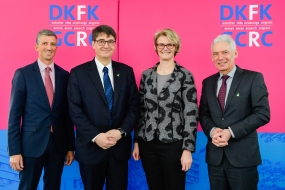Cancer research in Germany joins forces
At the 1st German Cancer Research Congress, taking place on February 4 and 5 in Heidelberg, around 500 participants meet to exchange knowledge and ideas about what excellent research in Germany can contribute to the fight against the widespread disease of cancer. Anja Karliczek, Federal Minister of Education and Research, and Theresia Bauer, State Minister of Science, Research and the Arts, participated in the opening event on World Cancer Day.
The German Cancer Society (Deutsche Krebsgesellschaft), German Cancer Aid (Deutsche Krebshilfe) and the German Cancer Research Center (Deutsches Krebsforschungszentrum, DKFZ) jointly organize the 1st German Cancer Research Congress (GCRC). It is the first joint initiative of the "National Decade Against Cancer" campaign.

The Chairmen of the first German Cancer Research Congress Frederik Wenz (German Cancer Society), Michael Baumann (German Cancer Research Center) and Gerd Nettekoven (German Cancer Aid) (left to right) with the Federal Minister of Education and Research Anja Karliczek.
© Uwe Anspach/ DKFZ
The Federal Minister of Education and Research, Anja Karliczek, said at the opening event: "In the National Decade Against Cancer, we intend to join forces. Researchers, physicians and all other partners unite in the battle to better comprehend cancer, prevent cancer and cure cancer. Our best tool is research. Therefore, the 1st German Cancer Research Congress is an ideal kickoff of the campaign. Here, the best brains in German cancer research come together with the goal of jointly taking on this disease."
Theresia Bauer, Baden-Wuerttemberg State Minister of Science, Research and the Arts, added: "In Germany, we have excellent cancer research at many locations. Heidelberg is one of the top international research locations. Nevertheless, more collaboration is needed if we want to achieve even more in cancer research. I am pleased that the top representatives of German cancer research are convening in Heidelberg to promote collaboration and exchange."
"With the GCRC, we offer Germany's first ever conference covering the entire spectrum of topics from basic cancer research through to the translation of research results into clinical trials," said DKFZ Chairman and Scientific Director Michael Baumann. "The event is intended to be a stimulus for closer cooperation within the cancer research community in Germany as part of the 'Decade Against Cancer' campaign."
"Reinforced cancer research is needed in order to further enhance the care of people who suffer from cancer and also to find more effective possibilities of preventing cancer for the whole population," said Gerd Nettekoven, Chairman of the Board of German Cancer Aid. He continued that particularly in the area of cancer risk factors, much evidence is still lacking and that prevention research in Germany must be given much higher priority than before. "For this reason, we are very pleased that prevention is part of the scientific program at the 1st German Cancer Research Congress and that it will also be at the top of the agenda in the 'National Decade Against Cancer'."
Tumor immunology is an example of research that directly concerns the patient: "In recent years, immunotherapies have virtually revolutionized the treatment of a number of cancer types," said Frederik Wenz, Member of the Council of the German Cancer Society. "However, alongside cases of sometimes spectacular curative outcomes, we also have many patients who do not benefit from the treatment. Why this is so and what can be done to change this are among the most pressing questions in cancer research." An equally topical question is which immunological therapy approaches will find their way into patient care besides the already established treatment with checkpoint inhibitors. Therefore, the congress dedicates a lecture session as well as a workshop to this topic.
In order to encourage communication and to emphasize the interactive character of the event, the organizers have placed a special focus on supporting formats such as an extensive poster exhibition. The discussion of research results initiates informal talks between scientists who share the same interests.
Numerous workshops are offered to promote an intensive exchange in small groups. They offer young scientists the possibility to enter into in-depth dialog with renowned scientists. The workshops focus particularly on topics relating to innovative technologies that have been introduced into cancer research very recently. Examples include the possibility to grow patient-individual tumor models (called organoids) in the Petri dish for testing agents in them as well as reprogramming cancer cells.
The large number of registrations confirms a great interest in the congress. Therefore, there are plans to offer this new congress format at regular two-year intervals in the future.
The congress is organized jointly by the DKFZ, the German Cancer Society (Deutsche Krebsgesellschaft), German Cancer Aid (Deutsche Krebshilfe) and their networks – the Network of Oncological Centers of Excellence (CCC network), the German Cancer Consortium (DKTK), the National Centers for Tumor Diseases (NCT), and the Experimental Cancer Research working group (AEK). The Federal Ministry of Education and Research (BMBF) provides financial support for the congress.
With more than 3,000 employees, the German Cancer Research Center (Deutsches Krebsforschungszentrum, DKFZ) is Germany’s largest biomedical research institute. DKFZ scientists identify cancer risk factors, investigate how cancer progresses and develop new cancer prevention strategies. They are also developing new methods to diagnose tumors more precisely and treat cancer patients more successfully. The DKFZ's Cancer Information Service (KID) provides patients, interested citizens and experts with individual answers to questions relating to cancer.
To transfer promising approaches from cancer research to the clinic and thus improve the prognosis of cancer patients, the DKFZ cooperates with excellent research institutions and university hospitals throughout Germany:
The DKFZ is 90 percent financed by the Federal Ministry of Education and Research and 10 percent by the state of Baden-Württemberg. The DKFZ is a member of the Helmholtz Association of German Research Centers.

